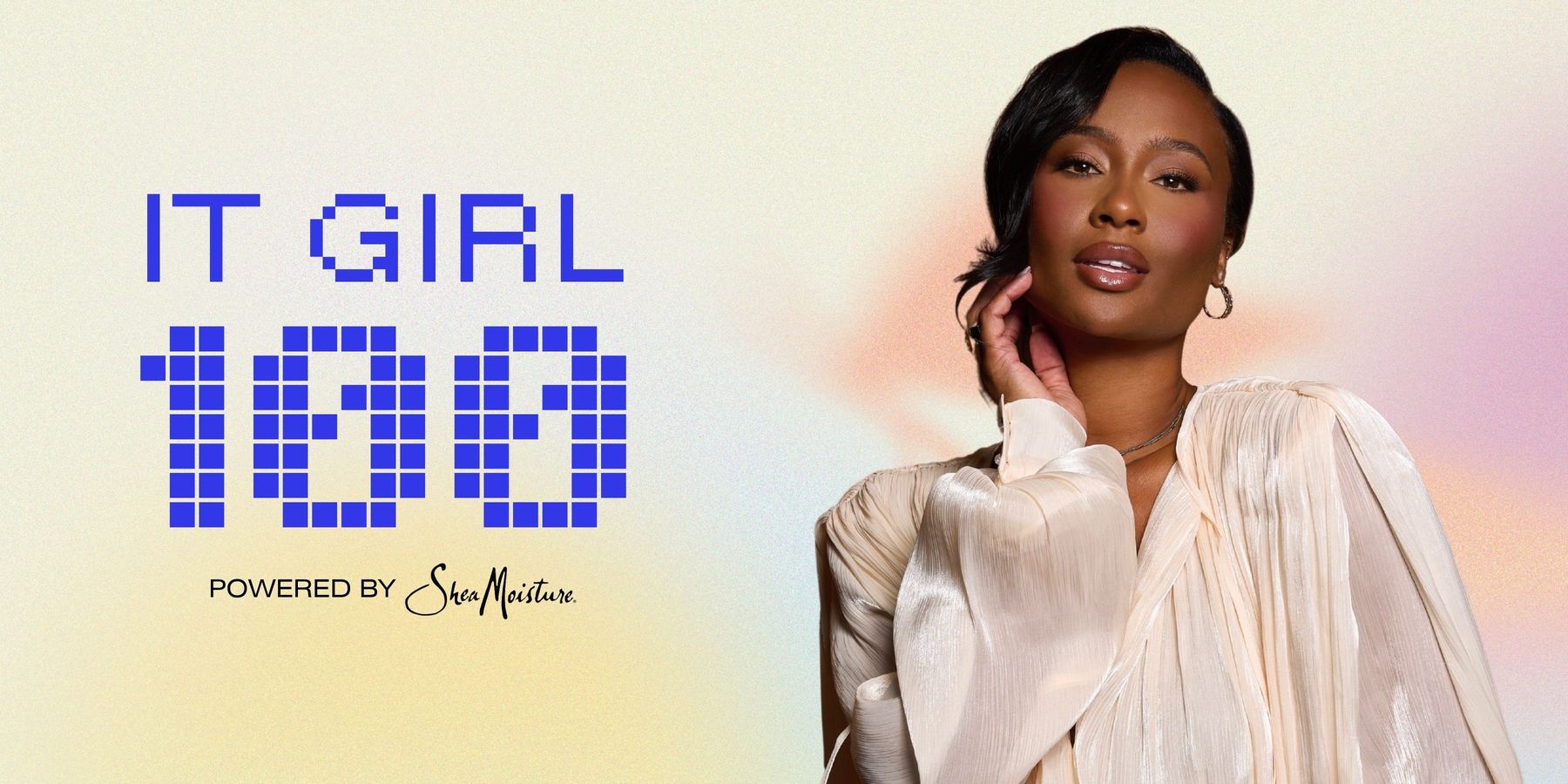Gina Prince-Bythewood On 'The Old Guard' & Creating Space For Black Women In Hollywood

Since commanding our attention with Love & Basketball 20 years ago, Gina Prince-Bythewood has been laser-focused on creating space for Black women in Hollywood. That mission doesn't change now that she has made history with Netflix's latest action film, The Old Guard.
As grand as this moment is, Gina isn't impressed by the fact that she is the first Black woman to direct a major comic-book film. She questions why it took all this time instead. "I hate that we're still having firsts in 2020," she tells xoNecole. "It's like, at what point does it stop?"

The Old Guard, which zooms in on an intimate camp of immortal mercenaries, isn't a mere win for Gina. In her eyes, it's a chance to ensure that Black women both in front of and behind the camera are no longer denied the shot to display the full scope of their talent. "I had a no-fail policy because I know how Hollywood works," she stresses. "There's such a spotlight on the few of us here that we have to succeed because in our success, others will get the opportunity."
In this xoChat, Gina reflects on cementing her name with Love & Basketball, overcoming rejection in Hollywood, and making room for KiKi Layne to shine in The Old Guard.
xoNecole: This year, you celebrated 20 years of 'Love & Basketball'. How has it been taking in how deep of a mark your first feature film has made?
Gina Prince-Bythewood: It really is amazing. It never gets old to hear that people dig the film. It's surreal that a film that was so hard to get made, that was such an incredible fight, that was such a personal story, has had longevity and that people still share it with family and friends after all this time. As an artist, that's what you dream about, of having your work sustain itself and affect people, so I'm blown away by it. It inspires me to keep doing what I'm doing.

Aimee Spinks/NETFLIX
What lesson from those early moments in your career do you keep close to the heart?
Overcome "no". That's the biggest thing. You only need one "yes".
When considering obstacles you’ve faced on your path, what keeps you from being jaded two decades into your career?
I'm acutely aware of the things that Hollywood has done wrong [and] how they're complicit in what is happening right now during this national reckoning, but what keeps me in this is I love to tell stories, I love what I do, and I know how important TV and film can be in shaping perception and changing culture. That sustains me. I only do things that I'm passionate about, and there are so many stories I want to tell, so there's always that excitement for me to get this into the world. The thing that creeps in every once in a while is knowing how hard it is to get some of these stories out there, but because I'm so passionate about it and know the game after 20 years and know that at some point somebody is going to say "yes", that absolutely keeps me going.
"I'm acutely aware of the things that Hollywood has done wrong [and] how they're complicit in what is happening right now during this national reckoning, but what keeps me in this is I love to tell stories, I love what I do, and I know how important TV and film can be in shaping perception and changing culture. That sustains me."

Aimee Spinks/NETFLIX
Thinking about the power that TV and film has, what on screen impacted you the most, especially when you think about why you decided to become a filmmaker in the first place?
There were two moments. When I was younger, I remember my family used to always sit down and watch M*A*S*H [together]. Then, one day I happened to turn the channel and Diff'rent Strokes was on, and it was the first time I felt like I saw myself reflected in this box, and I just became obsessed with it. Then in high school, when I was 17, I went to the movies and a trailer came up for She's Gotta Have It, and I got that same jolt of seeing a Black woman up there, and it affected me deeply. I wanted to give us that same jolt and give us the opportunity to see ourselves in ways that we can be inspired by.
With 'The Old Guard', you’ve become the first Black woman to direct a major comic-book film. How do you feel about that?
I hate that we're still having firsts in 2020. It's like, at what point does it stop? But, I'm proud of the fact that I got this opportunity to do it. I certainly worked hard to get it, and once I got it, I had a no-fail policy because I know how Hollywood works. There's such a spotlight on the few of us here that we have to succeed because in our success, others will get the opportunity. I carried that with me every day. That pressure fueled me as opposed to making me run away from it. I know that there are so many dope sisters out there that are as capable and eager to do the same thing, so I'm looking forward to them getting the shot.
"There's such a spotlight on the few of us here that we have to succeed because in our success, others will get the opportunity. I carried that with me every day. That pressure fueled me as opposed to making me run away from it. I know that there are so many dope sisters out there that are as capable and eager to do the same thing, so I'm looking forward to them getting the shot."

Aimee Spinks/NETFLIX
'The Old Guard' is an adaptation of the Greg Rucka comic book of the same name. What was it about this story that you gravitated to the most?
The [part I gravitated to] most was the fact that one of the old guards is a young, Black female hero. I was like, "Yeah, I need to put this in the world." I dug that she was naturally a warrior. There was such a normalcy to that. There wasn't some traumatic event that happened to her that forced her to find her strength. She was a Marine. She had it in her. It was innate in her. I love that narrative, and I love that it was two women at the forefront of the story with that same warrior mentality that I think that we all have, but we haven't always been given the encouragement to tap into. I also really dug the story. I liked what it had to say about finding your purpose and the importance of that, which was something very personal to me, and I felt the audience could connect with that despite the fantastical premise. I love that it was about the tragedy of immortality as opposed to the aspirational aspects. Prior to this movie, I used to think, I wish I could live forever. You think about the courage that would give you if you knew you couldn't die, but in doing this [film], you understand what that really means.
In our recent chat with KiKi Layne, she commended you for not allowing the action in the film to overpower the heart of the characters. Why was this so important to you?
What I love about the genre is the direction that it's really been going in the last couple of years where they feel more like action-dramas. That's what I love. I want to be able to care about the characters and not just watch action. If you don't care about the characters, if they're not furthering the story, then it gets monotonous to me. What I wanted to bring to this film was story first and character first, so that you, as an audience, are invested in and care about these people that you're spending two hours with.
You’ve dedicated your career to creating space for Black women to live on screen. What do you hope viewers take away from KiKi’s embodiment of Nile?
KiKi rocked it. I really want us to be able to look up on screen and see ourselves in a way that's inspiring. The best moment of this process was when we had an audience screening, and this sister, 22-years-old, commented that she wished she had Nile when she was 12-years-old. That was so dope to me. If we can see it for ourselves, we can start to live in that type of truth. The thing that makes Nile so badass is not just her strength and her swagger and her courage, but also her empathy and her vulnerability. I think that Nile and KiKi really embody all of that, and I think that she is definitely someone that we can aspire to be.
"If we can see it for ourselves, we can start to live in that type of truth. The thing that makes Nile so badass is not just her strength and her swagger and her courage, but also her empathy and her vulnerability. I think that Nile and KiKi really embody all of that, and I think that she is definitely someone that we can aspire to be."
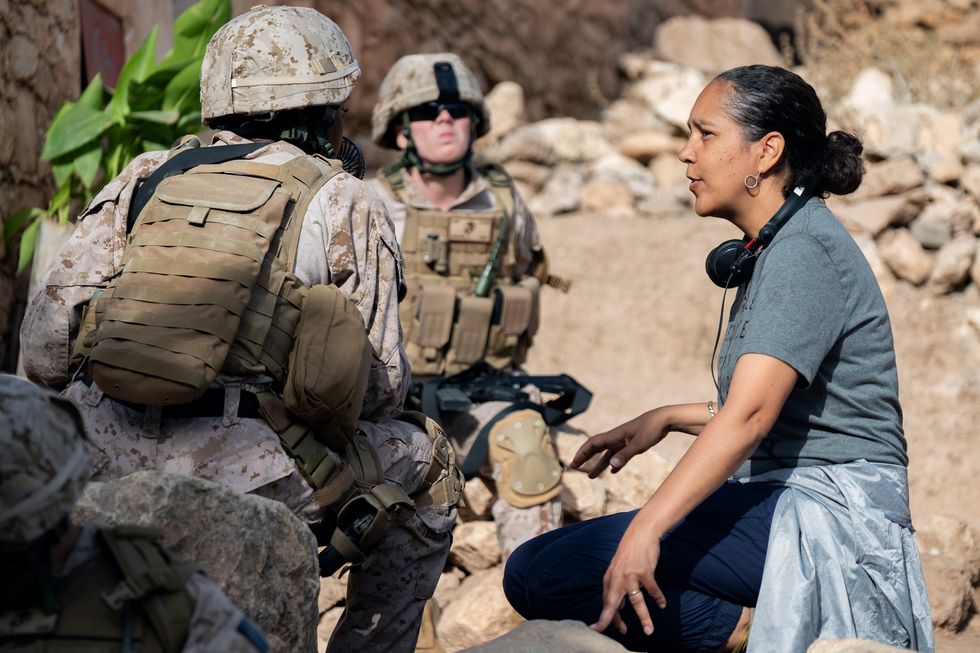
Aimee Spinks/NETFLIX
With one superhero film down, where do you go from here?
As soon as I finished [The Old Guard], I was exhausted. It's a lot to shoot a film like this. I just kept thinking that I can't wait to get to another movie in my head that I want to write that's smaller and more personal. I was going to take six months off and just relax and write and shoot that, and then this script came to me that's just so dope. It's going to be announced very shortly. It just felt like everything I've done in my career, including The Old Guard, put me in a position to be able to make this film for us, so that little movie that's still in my head is going to have to wait another two years (laughs).
For more of Gina, follow her on Instagram. The Old Guard is now streaming on Netflix.
Featured image by Getty Images
Exclusive: Viral It Girl Kayla Nicole Is Reclaiming The Mic—And The Narrative
It’s nice to have a podcast when you’re constantly trending online. One week after setting timelines ablaze on Halloween, Kayla Nicole released an episode of her Dear Media pop culture podcast, The Pre-Game, where she took listeners behind the scenes of her viral costume.
The 34-year-old had been torn between dressing up as Beyoncé or Toni Braxton, she says in the episode. She couldn’t decide which version of Bey she’d be, though. Two days before the holiday, she locked in her choice, filming a short recreation of Braxton’s “He Wasn’t Man Enough for Me” music video that has since garnered nearly 6.5M views on TikTok.
Kayla Nicole says she wore a dress that was once worn by Braxton herself for the Halloween costume. “It’s not a secret Toni is more on the petite side. I’m obsessed with all 5’2” of her,” she tells xoNecole via email. “But I’m 5’10'' and not missing any meals, honey, so to my surprise, when I got the dress and it actually fit, I knew it was destiny.”
The episode was the perfect way for the multihyphenate to take control of her own narrative. By addressing the viral moment on her own platform, she was able to stir the conversation and keep the focus on her adoration for Braxton, an artist she says she grew up listening to and who still makes her most-played playlist every year. Elsewhere, she likely would’ve received questions about whether or not the costume was a subliminal aimed at her ex-boyfriend and his pop star fiancée. “I think that people will try to project their own narratives, right?” she said, hinting at this in the episode. “But, for me personally – I think it’s very important to say this in this moment – I’m not in the business of tearing other women down. I’m in the business of celebrating them.”
Kayla Nicole is among xoNecole’s It Girl 100 Class of 2025, powered by SheaMoisture, recognized in the Viral Voices category for her work in media and the trends she sets on our timelines, all while prioritizing her own mental and physical health. As she puts it: “Yes, I’m curating conversations on my podcast The Pre-Game, and cultivating community with my wellness brand Tribe Therepē.”
Despite being the frequent topic of conversation online, Kayla Nicole says she’s learning to take advantage of her growing social media platform without becoming consumed by it. “I refuse to let the internet consume me. It’s supposed to be a resource and tool for connection, so if it becomes anything beyond that I will log out,” she says.
On The Pre-Game, which launched earlier this year, she has positioned herself as listeners “homegirl.” “There’s definitely a delicate dance between being genuine and oversharing, and I’ve had to learn that the hard way. Now I share from a place of reflection, not reaction,” she says. “If it can help someone feel seen or less alone, I’ll talk about it within reason. But I’ve certainly learned to protect parts of my life that I cherish most. I share what serves connection but doesn’t cost me peace.
"I refuse to let the internet consume me. It’s supposed to be a resource and tool for connection, so if it becomes anything beyond that I will log out."

Credit: Malcolm Roberson
Throughout each episode, she sips a cocktail and addresses trending topics (even when they involve herself). It’s a platform the Pepperdine University alumnus has been preparing to have since she graduated with a degree in broadcast journalism, with a concentration in political science.
“I just knew I was going to end up on a local news network at the head anchor table, breaking high speed chases, and tossing it to the weather girl,” she says. Instead, she ended up working as an assistant at TMZ before covering sports as a freelance reporter. (She’s said she didn’t work for ESPN, despite previous reports saying otherwise.) The Pre-Game combines her love for pop culture and sports in a way that once felt inaccessible to her in traditional media.
She’s not just a podcaster, though. When she’s not behind the mic, taking acting classes or making her New York Fashion Week debut, Kayla Nicole is also busy elevating her wellness brand Tribe Therepē, where she shares her workouts and the workout equipment that helps her look chic while staying fit. She says the brand will add apparel to its line up in early 2026.
“Tribe Therepē has evolved into exactly what I have always envisioned. A community of women who care about being fit not just for the aesthetic, but for their mental and emotional well-being too. It’s grounded. It’s feminine. It’s strong,” she says. “And honestly, it's a reflection of where I am in my life right now. I feel so damn good - mentally, emotionally, and physically. And I am grateful to be in a space where I can pour that love and light back into the community that continues to pour into me.”
Tap into the full It Girl 100 Class of 2025 and meet all the women changing game this year and beyond. See the full list here.
Featured image by Malcolm Roberson
How To Get Through Your First Holiday Season Without A Loved One
Being an adult orphan. It ain’t nothin’ to play with, boy. And although it certainly wasn’t on my personal bingo card that I would close out this year with my own official adult orphan club card (my father died 11 years ago and my mother, this past July), who actually comes to mind most for this particular piece is R&B singers Angie Stone and D’Angelo’s son, Swayvo Twain, being that he lost his mother back in March and then his father on what happened to be my own father’s birthday, October 14.
And as life would have it, that same day, a friend of mine and I went to go see Raphael Saadiq for his one-man show here in Nashville. If, like me, “Lady” (by D’Angelo) is totally your jam, that (among so many others) is something that you have D’Angelo and Raphael to thank for — and even for Raphael, I was like, “Geeze. This man lost two brothers in one year” because his blood brother (and fellow Tony! Toni! Toné! member), D'Wayne Wiggins also transitioned this past March. What a year. What a damn year.
Back to Swayvo Twain, though. After I saw numerous posts about the fact that D’Angelo’s song “Send It On” was a creative collaboration that his parents made in his honor after he was born — I found myself wondering just how many times he’s listened to it this year and especially over the past several weeks. And then, I was like, “Lawd. What is this man’s holiday season going to be like?” I can only imagine.
Holiday seasons mean different things to different people. Yet if you’re someone who has lost a dear loved one (familial or not) this past year and a part of you is absolutely not looking forward to the holiday season because of it — I just want you to know that I see you and I want to provide a few thoughts, just so you don’t have to overthink or unnecessarily pressure yourself or feel like you’ve got to “put on” anything during this time. You absolutely don’t.
And here, in more detail, is exactly what I mean by that.
Expect to Go Through the Five Stages of Grief. Repeatedly.
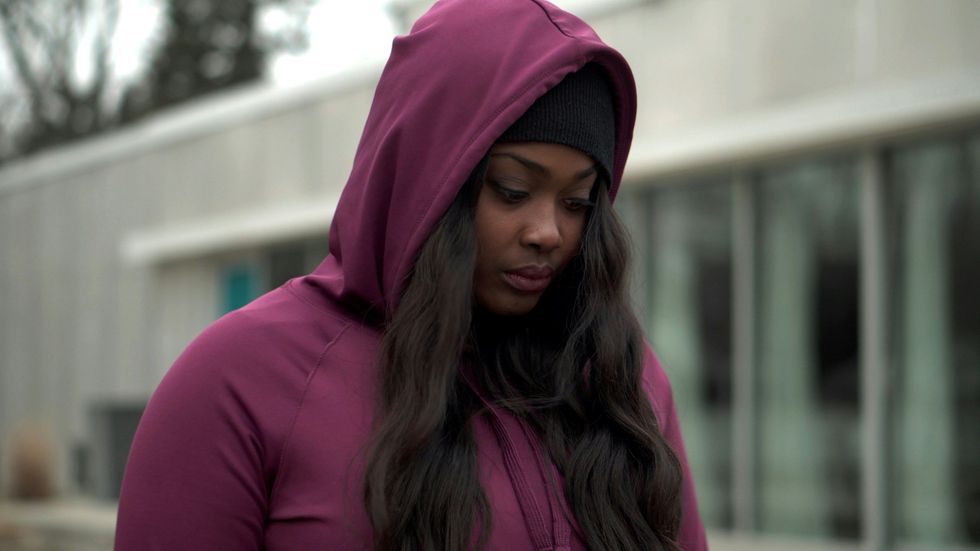
Unsplash
Grief is layered and sometimes really complicated. Partly because, well, you’ve heard of the five stages of grief, right — denial, bargaining, anger, depression and acceptance? Well, the thing is, sometimes you can find yourself going through some of those stages simultaneously. Like you might be in denial and angry. Or you might be depressed while accepting the reality that someone who you really cared about is gone. And what’s really wild is sometimes the oddest things can put you in those emotional spaces.
Take my godchildren’s mom, for example. There is a movie called Lucky 7 (Kelly Williams-Paisley, Patrick Dempsey) that makes me think about her. That’s because a part of her story is that she and the lead character in the film both lost their mother to cancer when they were seven. Anyway, Rissi (that’s her name although everyone knows that I typically just refer to her as “my godchildren’s mom” — LOL) said that a couple of weeks ago, she woke herself up sobbing and missing her mom, even though she’s been gone for 37 years now.
When she said that she didn’t know where the wave of grief came from, I reminded her about her single “Old Black Southern Woman” (which premiered November 7 and I've included under this point, so that I can show my babies off) and since the song is in tribute to her mother, that’s probably the origin story of it all.
Honestly, though, when you lose someone dear, you don’t really need a reason. I mean, think about it — none of us “love with an expiration date” and so trying to figure out what to do with the emotions, the commitment, the relationship now that everything about it has permanently shifted? Yeah, it can take you on quite the emotional roller coaster ride. Repeatedly. Without real cause or reason.
And you know what? That is okay.
Grieve how you need to…as it comes.
Surround Yourself with People Who Will Let You…BE
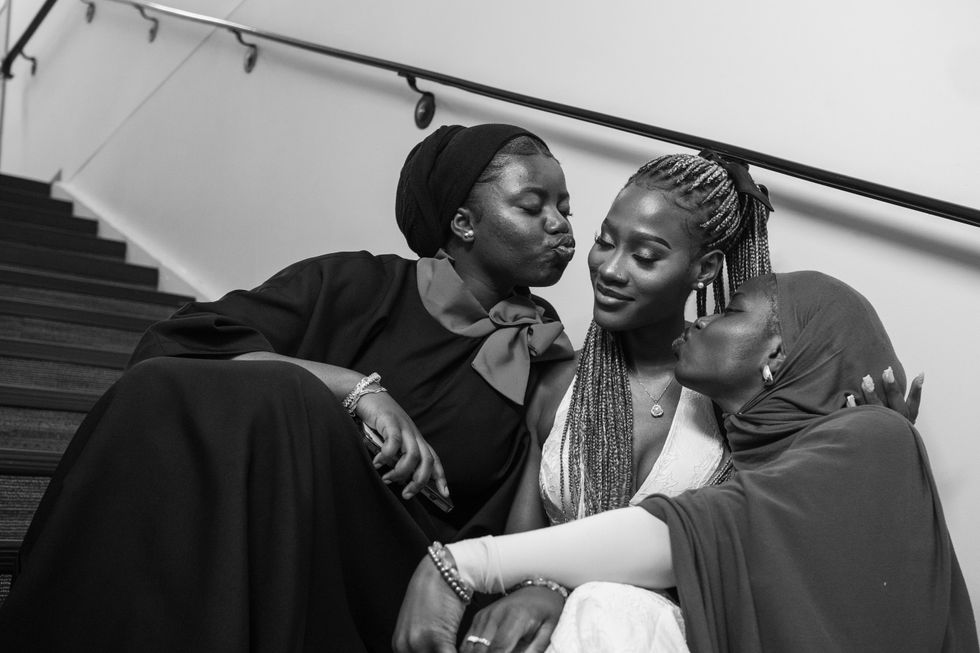
Unsplash
One thing about losing a parent or a spouse or (whew) a child is, once it happens to you and then you hear about it happening to someone else, you are able to empathize on a whole ‘nother level compared to those who have yet to experience that depth of loss. As a direct result, you get that sometimes they will be in a good mood and then sometimes, without warning, they will isolate. You get that sometimes they will take you up on your offer to hang out and then sometimes you may not hear from them for weeks on end. You even get that sometimes, their energy will switch up on you in mid-conversation and that you can’t personalize it. They are in “grief aftershock” and sometimes, it catches them totally off guard.
And that’s why it’s so important — crucial even — that you are intentional, especially this year, to surround yourself with people who will give you the space and grace to grieve however you need to. Because while you shouldn’t be out here just being mean and rude, if you’re not your best self, folks who are really in tuned to the magnitude of your loss will get that — even to the point of not stressing you out or guilt tripping you if you’d prefer to sit this holiday season (or portions of it) out.
Yeah, the great grief support people? They will be interested in you doing what is best for you — not in you doing what they think is best for you. BIG DIFFERENCE THERE, CHILE.
Try Not to Emotionally Trigger Yourself
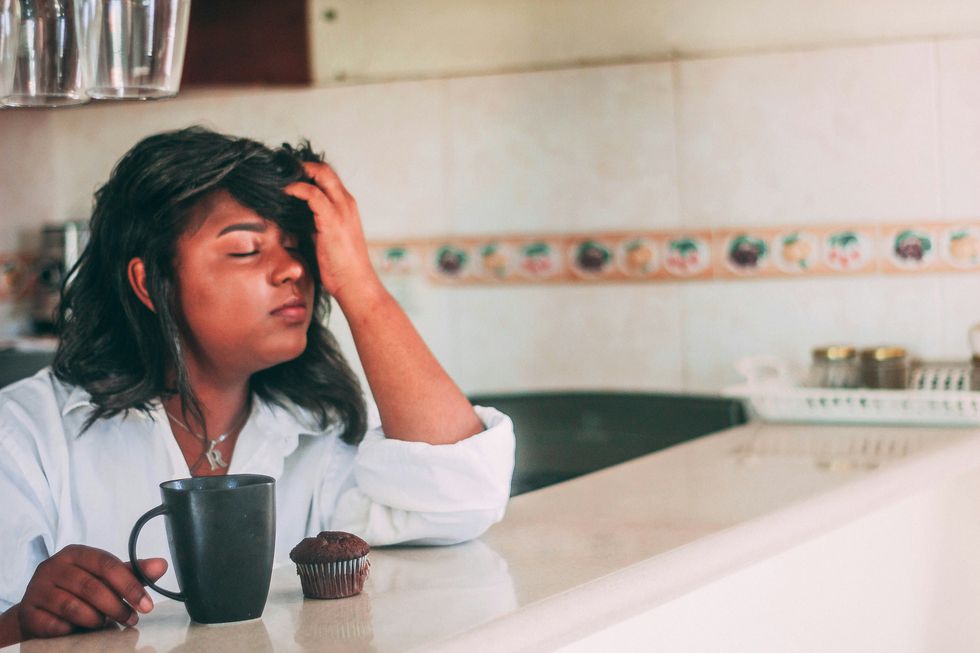
Unsplash
This is a tricky one because, since it is your first holiday season without your loved one, probably all kinds of stuff will get to you. All I’m saying is that you should let memories happen naturally instead of looking for things that will make you feel bad or low.
For instance, if going through every photo of them that you have in your possession will bring you comfort, by all means, pull them all out. However, if doing that is going to make you feel really sad and put you in a state of restlessness and irritation — why punish yourself in that way? Or if there is a holiday movie that the two of you enjoyed together and watching it will somehow make you feel close to them, enjoy. On the other hand, if it’s going to have you an emotional wreck to where you can barely sleep or get out of bed — why do that to yourself?
One way that AI defines an emotional trigger is this: “An emotional trigger is a stimulus that causes a strong, often overwhelming emotional or psychological reaction that feels disproportionate to the current situation”. Did you catch all of that? Triggers are something that overwhelms you in spite of what your current situation may actually be.
Listen, grief is overwhelming enough. Try to be really kind and discerning by not going out of your way to emotionally trigger yourself in the process of handling all that is already on your mind, heart and spirit’s plate.
Prioritize Self-Care
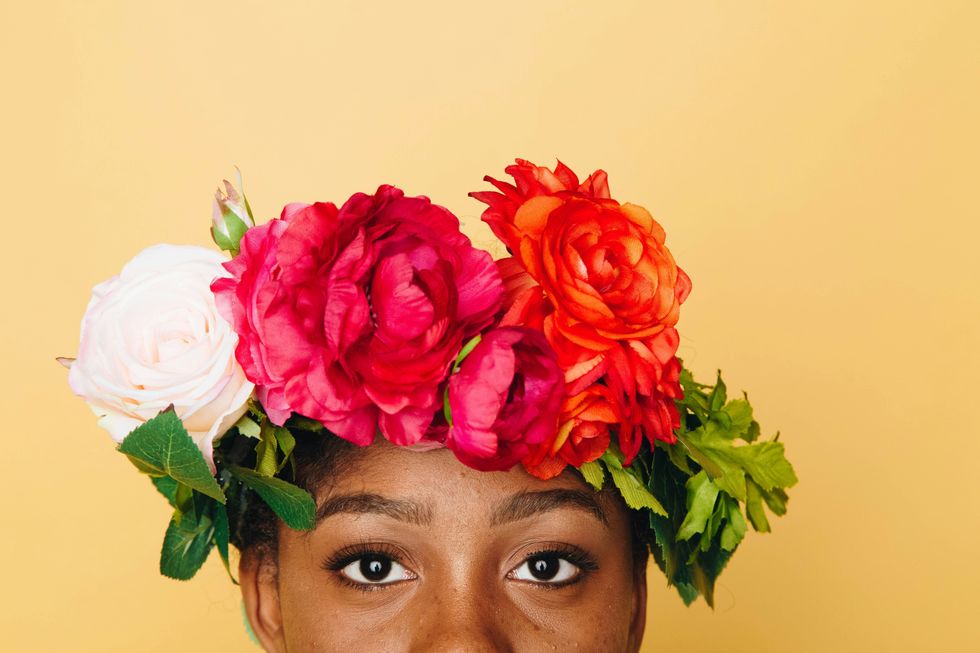
Unsplash
Years ago, I wrote an article for the platform entitled, “The Self-Care Checklist Every Woman Needs.” When you get a chance, please check it out because it covers things like forgiving yourself and taking personal days — both of which are relevant to this piece.
Another reason why losing a loved one can be devastating for some of us is because it can bring forth feelings of regret. Maybe you didn’t have a specific conversation with them that you should’ve. Perhaps you wish that you had taken better advantage of the time that you had with them while they were alive. It could be that you regret not being more of what they needed. Whatever the case may be, their purpose is complete on this planet.
You know whose isn’t? LOOK IN THE MIRROR. You’ve got to forgive yourself and — as I’ve said many times before, one of my favorite definitions of forgiveness is by author Gary Zukav: “Accepting that the past can’t change,” which, interestingly enough, could play a role in the final stage of grief which is acceptance.
And the personal days part? I mean, it is the holiday season, right? If you’ve got personal or vacation days, TAKE THEM. Just as much as work can get your mind off of things, it can also wear you down too, if you’re not careful. Spending some days doing nothing but sleeping, reading or watching movies could be just what you need right now. Because when you’re healing from the loss of the loved one, self-care isn’t a luxury — it is absolutely paramount.
Be Okay with Not Knowing
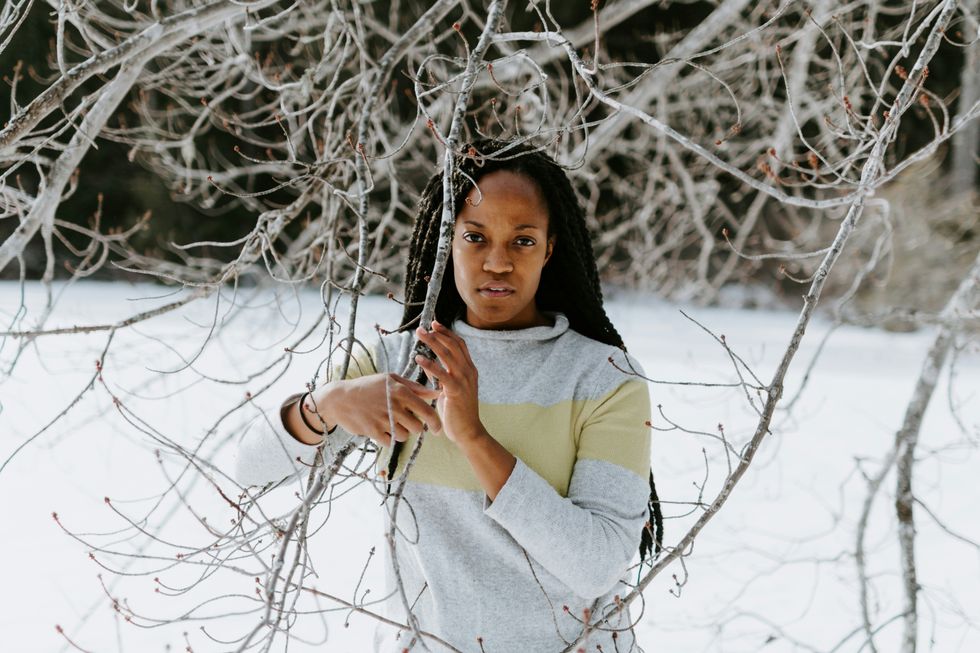
Unsplash
“Know” is an interesting word. One of its definitions is “to perceive or understand as fact or truth; to apprehend clearly and with certainty.” That said, a few weeks ago, my mother’s husband sent me a grief quote. Although it wasn’t something that I personally resonated with (for many reasons that we don’t have time to get into today), I do believe that many things happen for more than a reason; they have a purpose — and perhaps the quote was for this article:
"When you lose someone, it feels like the entire map of your life has been erased. You still hold the paper in your hands, but the destination seems to be gone. And that’s just one part of grief. People don’t really talk about…Not just the missing person, but the missing sense of direction. The hardest truth is that no one can hand you a new map to your life. It’s up to you to build a compass on your own, one day and one moment at a time. That compass won’t appear overnight, but every choice you survive becomes part of it." (Brendan Shaw)
One thing that is so…let’s go with the word “rough” about death is that it comes in and alters the plans that you had for your life when it comes to the person you lost — and that can have you out here on some “So, what now?”…without having a single clue. Because you’re trying to wrap your mind around what happened and how you are supposed to adjust to it, it can feel like you don’t really have the words, let alone any ideas, about how to move forward. And that is something that you need to make peace with — the not knowing, I mean.
Yeah, that reminds me. There is a project that my mother co-executive produced many years ago. On it, there is a song entitled, “You Don’t Have to Know Why” (Tata Vega/Maia Amada). The chorus goes as follows:
You don’t have to know why
‘Cause the why is unimportant
You don’t have to know when
‘Cause time is not a factor
You don’t have to know what
You don’t have to know how
‘Cause his love for you is all you need to know
Geeze. You see how many times “know” pops up? When you lose someone and your life feels like it has totally turned upside down because of it — be patient with yourself; you don’t have to perceive or understand what’s next. Not right now. Sometimes just getting out of bed, putting one foot in front of another towards your shower and actually getting into is more than enough.
Oh, and did you peep how the last line of the chorus says that “his love” is all that you need to know? They are talking about God — and that brings me to my next point/tip.
KNOW That God Can Handle Every Single Emotion
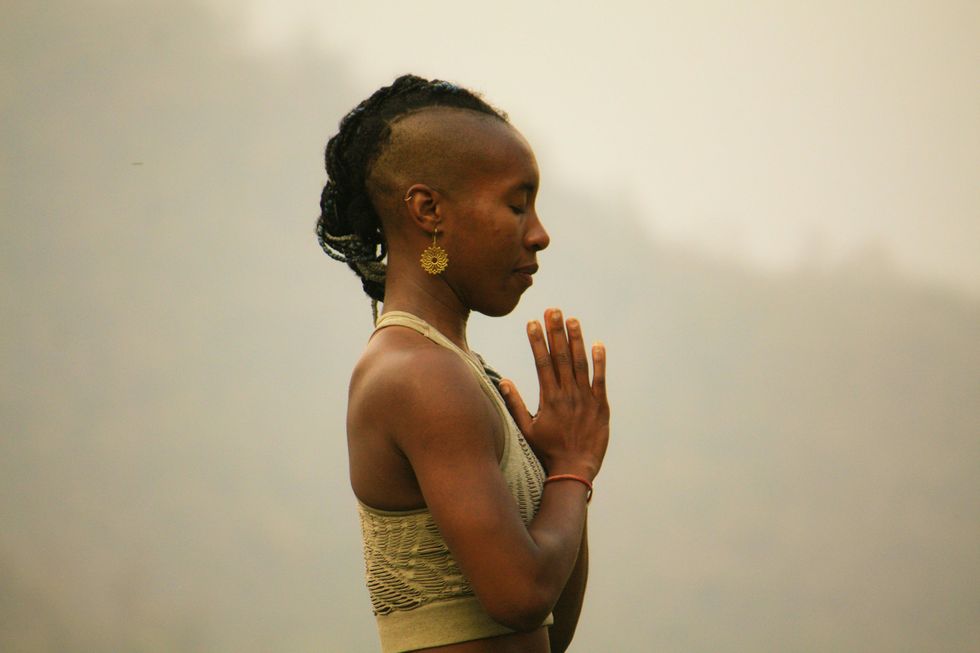
Unsplash
Someone in my world is really angry with God right now about a loss that they currently experienced. It’s not the death of a person; it’s the end of a marriage (which is a death in its own kind of way). They are angry with God because they feel like he doesn’t care that they gave their all and their spouse left anyway.
Another topic for another time is that we can’t be thankful that God gave us the power of choice/free will and then turn around and want him to rescind that offer to others. For now I’ll just say what I said to them: “Girl, do you know how many times I’ve been mad at God? And do you know that God doesn’t stop being God just because I’m angry. He can handle your emotions. Trust me.”
And P.S.: God isn’t mad that you’re mad. That’s why I’m so fond of the Scripture, “Be angry, and do not sin. Meditate within your heart on your bed, and be still. Selah.” (Psalm 4:4 — NKJV) Hmph. When I look at that word “meditate”, that makes me think of another verse: “Be still, and know that I am God; I will be exalted among the nations, I will be exalted in the earth!” (Psalm 46:10 — NKJV)
One definition of anger is “a strong feeling of displeasure and belligerence aroused by a wrong” — and why would you think that God wouldn’t understand that you aren’t pleased or that you feel wronged by losing someone? Of course, he does. And yet, peep the wisdom of King David. He said that when you feel that way, don’t do something reckless or even unwise. Instead, MEDITATE. Get still enough to remember that God is involved, even in your pain, confusion and emotional exhaustion. Because he is.
Exercise Self-Compassion with Every Moment…As It Comes
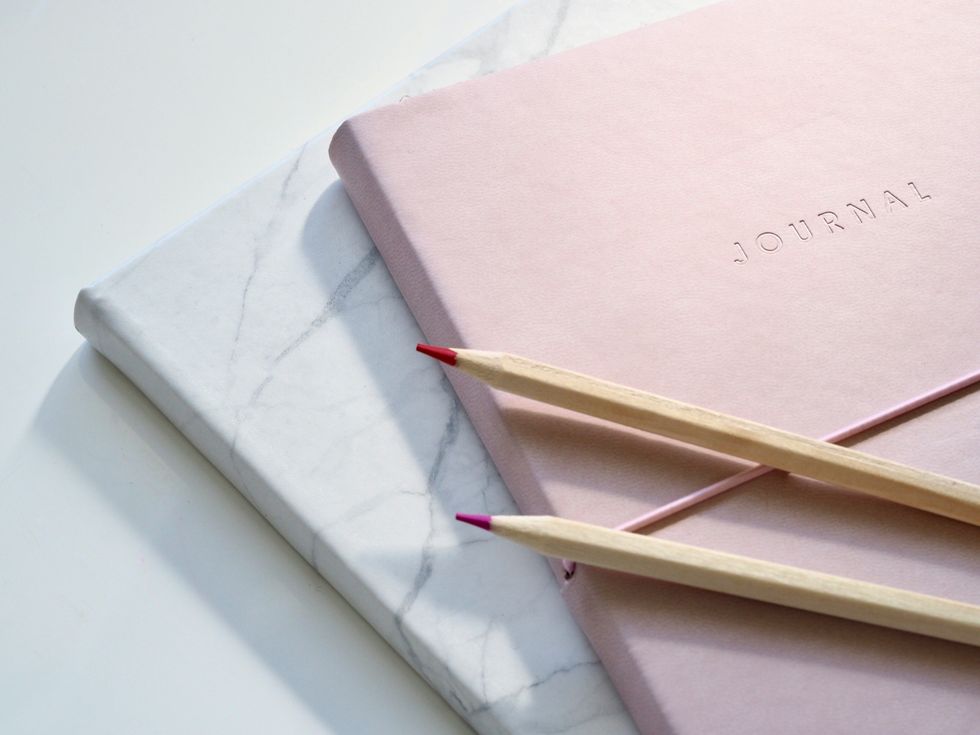
Unsplash
And finally, I am big on the importance of practicing self-compassion; so much to the point where I penned the article, “12 Ways To Be Far More Self-Compassionate Every Day” a few years back. Compassion means “a feeling of deep sympathy and sorrow for another who is stricken by misfortune, accompanied by a strong desire to alleviate the suffering” and suffering means “to undergo or feel pain or distress,” “to sustain injury, disadvantage, or loss” and “to endure pain, disability, death, etc., patiently or willingly.”
Self-compassion, in part, is about recognizing that you are suffering and then being intentional about doing what you can to reduce the pain that you are experiencing. Journal it out. Talk to a friend. Go for a long walk. Get a mani/pedi or massage. Take a nap. Indulge in some comfort food. See a grief therapist — love on yourself enough by giving your grief a platform to express itself and then find an outlet for the energy to manifest into something that will make you feel…encouraged.
____
My first major death blow happened when I was 21. I lost my fiancé on November 3, 1995 and then my closest great-grandparent the following day. Listen here, that first loss? It feels like you can’t breathe for days at a time — and that first holiday season? It’s pretty much a blur with many moments of heartache in them. That’s the bad news.
The good news is that you will get through it. Like a woman once said on a favorite sitcom of mine once upon a time, “Even despair will eventually exhaust itself” — and while it might not feel that way right now, that is 1000 percent the truth.
I won’t lie to you — probably not by Thanksgiving. Christmas and New Year’s either. Yet if you take my lived-out tips to heart, I believe that they can help make this first year without your loved one more bearable.
You might even smile and laugh a little bit. Yet if you don’t…again, give yourself some grace.
Yeah, feel what you feel…until you don’t.
At the end of the day, sis, that is just what self-love and validation during loss is all about.
Let’s make things inbox official! Sign up for the xoNecole newsletter for love, wellness, career, and exclusive content delivered straight to your inbox.
Featured image by Shutterstock








